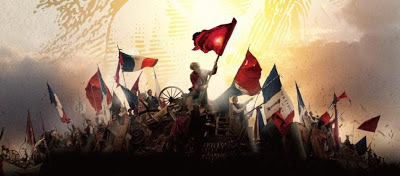Miserable- Wretchedly unhappy or uncomfortable.
Yes, the title is French for the miserable ones but the movie in its entirety is so much more than that. A thief, a priest, a prostitute an officer, rebels, and a girl....all lives of people that lead various lives that intertwine to create this one plot in historical French times.
Quick Synopsis..... "Les Misérables" (translated most accurately as "The Miserable Ones") tells the tale of a released prisoner named Jean Valjean, who was imprisoned for nineteen years for stealing a loaf of bread for his starving family. Given his new-found freedom, he violates his parole. His life is changed forever through the generosity and grace shown to him by a priest; as he learns he must redeem himself in the eyes of God. Despite becoming a respectable mayor, he is chased by Javert, a police inspector who believes solely in atonement through the Law. The law leads to frustration and death, but grace leads to a life of selflessness and hope. This game of cat vs. mouse is the spine to the epic story of Les Misérables, as Valjean encounters many impoverished characters who help him seek redemption for his sins along the way.
Jean Valjean played by Hugh Jackman did a phenomenal job along with the rest of the cast. Only a true actor could have acted in that movie. Plus you definitely had to be able to sing if you wanted to be casted in that movie. Watching the movie, I was very sucked into the plot and just completely absorbed in the historical time period.
I usually watch movies because of actors I know and like. When I was watching Les Mis, I didn't see the actors as actors or as Hugh Jackman, Anne Hathaway, or Russell Crowe. I saw them as only their characters and that's not easy for me personally. They played their parts so well that I was not thinking about their career, personal life, or even their name (and the weight it carries). Watching a cast as diverse as this Les Mis cast was such a treat to see blended together so well.
The only critique I had with any part of the film was the music. Now do not get me wrong, I am a musical nut but 95% of the film was singing. I love my musicals but there were like five lines of dialogue throughout the entire movie (I know I'm exaggerating) but almost everything was sung; some words were not necessary to sing. In a way, the music/ singing was needed because the movie had a lot of subtlety and I do not believe viewers would understand if some of the obvious was not put in the words of the songs. The music itself was phenomenal but I would have personally preferred a bit more dialogue between the numbers. I like hearing musical numbers where there are rounds, reprises, and vocal range because it is what I'm used to seeing on stage or in musical movies.
Another aspect was the symbolism. The walking on the ledge from Javert (Russell Crowe) and the similarity amount the lives of Fantine (Anne Hathaway) and Valjean and Eponine (Samantha Barks). The deaths in this movie (although not condoned in real life) have a peaceful beauty to them. Finding comfort in the endings, death in this movie is not only a means to end but it is a soul at rest from the torture of the world, guilt on one conscience, or fight for what is right. Death plays the last character in an ensemble cast that strikes who it wants.
On an Oscar worthy note was the cinematography. That was a huge artistic aspect I could not help but notice while being engrossed in the plot. During the slow solo numbers the camera had very long takes. For example, during Anne Hathaway's powerfully beautiful rendition of "I Dreamed A Dream" the camera did not cut to another shot the entire song. It constantly stayed on Fantine just as different positions until it was stagger the rest of the song. The film had a lot of long takes where it did not cut to another shot. I like this feature because it is proof the actors knew their lines/songs or else they would have to retake an entire five minute take.
I almost want to call the filming style French new wave but that is only because it took place in France. I feel it was close to early Japanese cinema because of the long takes, oblique angles, and life that was going on even when the camera was not focused on a character. That is one thing I enjoy seeing but it torture me not knowing what happens in the characters lives when the camera is not on them. I enjoy being the fly on the wall very much in movies.
My favorite part of the film was definitely the French Revolution portion. I'm a sucker for rebellious movements. I enjoy protest for a good cause and so I felt empowered with the lower class of people because they were not being treated fairly. The musical rounds and multiple musical layers were so artistically captured during the last portion of the movie.
The movie was well put together, cast, symbolism, cinematography, and music. Word of advice, only see the movie if you love musicals and you are prepared for the story line. I know those that dislike musicals or think the movie sounds depressing. Do not go if you fit onto this category. Otherwise, it is a very good film in a subtle artistic way.












